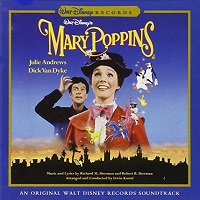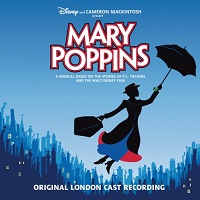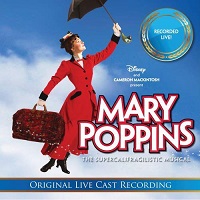 Film Soundtrack, 1964 (Buena Vista/Walt Disney Records)
Film Soundtrack, 1964 (Buena Vista/Walt Disney Records)  (5 / 5) Disney’s Mary Poppins has been beloved from the moment audiences first saw the film in 1964, permeating our culture and becoming a hallmark for family friendly entertainment. Even if you’re a neophyte to the story of the mysterious and magical nanny who teaches a British family the importance of love, fun, and compassion, you’ll understand why the film has attained classic status with just one listen to this soundtrack. The score, by brothers Richard M. and Robert B. Sherman, remains timeless, with many of the songs long ago having achieved the status of internationally recognized standards: “A Spoonful of Sugar,” “ Jolly Holiday,” “Supercalifragilisticxpialidocious,” et al. Indeed, it’s difficult to think of another original movie musical that has produced as many great songs — and even the lesser-known ones, such as “Sister Suffragette” and “The Perfect Nanny,” are clever and charming enough to avoid being the sort of “skippable” tracks that even some of the best Broadway cast albums contain. As the action of the film is set in London in the early 1900s, Irwin Kostal’s arrangements pay fitting homage to Edwardian music halls, and his incidental music (included on deluxe editions of the soundtrack) craftily rearranges the Sherman Brothers’ compositions to feel like new pieces. As for the cast, they remain unbeatable. Julie Andrews made one of the most smashing screen debuts in history as Mary Poppins, a role that showcases her immense range, from comedic vaudevillian (“Supercalifragilisticxpialidocious”) to intimate chanteuse (“Feed the Birds”). By her side is Dick Van Dyke, effervescent as Bert, a jack-of-all-trades and loyal friend to Mary and her charges, Jane and Michael Banks. Though Van Dyke’s Cockney accent is legendarily awful, it really doesn’t matter at this point, as its humorous inauthenticity has taken on its own charming, nostalgic quality. In short, this soundtrack is a perfect companion to the landmark film. — Matt Koplik
(5 / 5) Disney’s Mary Poppins has been beloved from the moment audiences first saw the film in 1964, permeating our culture and becoming a hallmark for family friendly entertainment. Even if you’re a neophyte to the story of the mysterious and magical nanny who teaches a British family the importance of love, fun, and compassion, you’ll understand why the film has attained classic status with just one listen to this soundtrack. The score, by brothers Richard M. and Robert B. Sherman, remains timeless, with many of the songs long ago having achieved the status of internationally recognized standards: “A Spoonful of Sugar,” “ Jolly Holiday,” “Supercalifragilisticxpialidocious,” et al. Indeed, it’s difficult to think of another original movie musical that has produced as many great songs — and even the lesser-known ones, such as “Sister Suffragette” and “The Perfect Nanny,” are clever and charming enough to avoid being the sort of “skippable” tracks that even some of the best Broadway cast albums contain. As the action of the film is set in London in the early 1900s, Irwin Kostal’s arrangements pay fitting homage to Edwardian music halls, and his incidental music (included on deluxe editions of the soundtrack) craftily rearranges the Sherman Brothers’ compositions to feel like new pieces. As for the cast, they remain unbeatable. Julie Andrews made one of the most smashing screen debuts in history as Mary Poppins, a role that showcases her immense range, from comedic vaudevillian (“Supercalifragilisticxpialidocious”) to intimate chanteuse (“Feed the Birds”). By her side is Dick Van Dyke, effervescent as Bert, a jack-of-all-trades and loyal friend to Mary and her charges, Jane and Michael Banks. Though Van Dyke’s Cockney accent is legendarily awful, it really doesn’t matter at this point, as its humorous inauthenticity has taken on its own charming, nostalgic quality. In short, this soundtrack is a perfect companion to the landmark film. — Matt Koplik
 Original London Cast, 2005 (Walt Disney Records)
Original London Cast, 2005 (Walt Disney Records)  (4 / 5) Although Disney’s Mary Poppins is a beloved classic, author P.L. Travers, who wrote the book series on which the film was based, famously hated it. For this reason, Travers initially refused any further adaptations of her stories about the magical nanny while she was alive — that is, until producer Cameron Mackintosh persuaded her to grant him the rights to create a stage musical. Travers acquiesced on the condition that the entire creative team for the project would be British and would exclude everyone involved in the Disney movie. Mackintosh kept his word, to a certain extent: Although he collaborated with Disney Theatrical Productions so that the show could contain the most famous songs from the film, Mackintosh did bring on an entirely British team, including West End regulars George Stiles and Anthony Drewe to create new songs, expanding the score and giving the work a drier tone. While the final result isn’t as ebullient as the film, it’s still charming. The work of Stiles and Drewe is enjoyable in its own right — and, partly thanks to William David Brohn’s intelligent orchestrations, the score feels like a unified work, even if it does have two sets of writers. As heard on the cast album, the supporting players are a bit of a mixed bag: A bold and unleashed Rosemary Ashe stands out as the show’s villain, Miss Andrew (a character added for the musical), in “Brimstone and Treacle,” while Linzi Hatley’s Mrs. Banks is miscast, her modern-style vocalization at odds with the character’s new song, “Being Mrs. Banks” (a replacement for the film’s more entertaining “Sister Suffragette”). Gavin Lee is a wonderful Bert, and Charlotte Spencer and Harry Stott give intelligent performances as Jane and Michael, rewritten here as far brattier versions than the characters in the movie. But the biggest perk of the album is Oliver Award winner Laura Michelle Kelly’s performance as Mary Poppins. Charming, elegant, and ethereal, Kelly swims through the score with her captivating voice, elevating new songs such as “Practically Perfect” while bringing new life to “A Spoonful of Sugar” and other classics. If this recording isn’t the monumental achievement of the soundtrack, with Kelly leading the charge, it stands on its own. — M.K.
(4 / 5) Although Disney’s Mary Poppins is a beloved classic, author P.L. Travers, who wrote the book series on which the film was based, famously hated it. For this reason, Travers initially refused any further adaptations of her stories about the magical nanny while she was alive — that is, until producer Cameron Mackintosh persuaded her to grant him the rights to create a stage musical. Travers acquiesced on the condition that the entire creative team for the project would be British and would exclude everyone involved in the Disney movie. Mackintosh kept his word, to a certain extent: Although he collaborated with Disney Theatrical Productions so that the show could contain the most famous songs from the film, Mackintosh did bring on an entirely British team, including West End regulars George Stiles and Anthony Drewe to create new songs, expanding the score and giving the work a drier tone. While the final result isn’t as ebullient as the film, it’s still charming. The work of Stiles and Drewe is enjoyable in its own right — and, partly thanks to William David Brohn’s intelligent orchestrations, the score feels like a unified work, even if it does have two sets of writers. As heard on the cast album, the supporting players are a bit of a mixed bag: A bold and unleashed Rosemary Ashe stands out as the show’s villain, Miss Andrew (a character added for the musical), in “Brimstone and Treacle,” while Linzi Hatley’s Mrs. Banks is miscast, her modern-style vocalization at odds with the character’s new song, “Being Mrs. Banks” (a replacement for the film’s more entertaining “Sister Suffragette”). Gavin Lee is a wonderful Bert, and Charlotte Spencer and Harry Stott give intelligent performances as Jane and Michael, rewritten here as far brattier versions than the characters in the movie. But the biggest perk of the album is Oliver Award winner Laura Michelle Kelly’s performance as Mary Poppins. Charming, elegant, and ethereal, Kelly swims through the score with her captivating voice, elevating new songs such as “Practically Perfect” while bringing new life to “A Spoonful of Sugar” and other classics. If this recording isn’t the monumental achievement of the soundtrack, with Kelly leading the charge, it stands on its own. — M.K.
 Australian Cast, 2011 (Walt Disney Records)
Australian Cast, 2011 (Walt Disney Records)  (2 / 5) This live recording of a performance of the Australian production of Mary Poppins preserves all the revisions to the show that were made after the London cast recording was released. (No cast album of the Broadway production was issued.) While there are some tweaks in arrangements and lyrics, the most notable change is the replacement of “Temper, Temper,” a nightmarish fever dream in which Jane and Michael are reprimanded by the toys they abuse in their nursery, with the less sinister “Playing the Game.” Neither song is particularly noteworthy, but “Temper, Temper” has a bit more bite to it and would probably have been given Travers’ seal of approval over “Playing the Game.” Other than that, this album isn’t much different from the London recording in terms of material. William David Brohn’s orchestrations perhaps sound a little richer here, and the cast brings a good deal of energy to their performances. The album is billed as “live,” but the performance and the engineering are clean enough that it sounds as if it were recorded in a studio, aside from some applause at the end of certain numbers. Some casting perks here are Matt Lee as an entertaining Bert and Marina Prior as an improvement over Linzi Hatley in the role of Mrs. Banks. The rest of the cast members are either equal or inferior to their London counterparts, with Judi Connelli lacking the necessary vocal heft for “Brimstone and Treacle.” Sadly, although Verity Hunt-Ballard as Mary Poppins has a pleasant voice, she can’t match Laura Michelle Kelly’s luxurious soprano, and her characterization is no better than presentable and professional. This album may please first-time listeners, but there is a greater deal of fun to be had from the previous two recordings. — M.K.
(2 / 5) This live recording of a performance of the Australian production of Mary Poppins preserves all the revisions to the show that were made after the London cast recording was released. (No cast album of the Broadway production was issued.) While there are some tweaks in arrangements and lyrics, the most notable change is the replacement of “Temper, Temper,” a nightmarish fever dream in which Jane and Michael are reprimanded by the toys they abuse in their nursery, with the less sinister “Playing the Game.” Neither song is particularly noteworthy, but “Temper, Temper” has a bit more bite to it and would probably have been given Travers’ seal of approval over “Playing the Game.” Other than that, this album isn’t much different from the London recording in terms of material. William David Brohn’s orchestrations perhaps sound a little richer here, and the cast brings a good deal of energy to their performances. The album is billed as “live,” but the performance and the engineering are clean enough that it sounds as if it were recorded in a studio, aside from some applause at the end of certain numbers. Some casting perks here are Matt Lee as an entertaining Bert and Marina Prior as an improvement over Linzi Hatley in the role of Mrs. Banks. The rest of the cast members are either equal or inferior to their London counterparts, with Judi Connelli lacking the necessary vocal heft for “Brimstone and Treacle.” Sadly, although Verity Hunt-Ballard as Mary Poppins has a pleasant voice, she can’t match Laura Michelle Kelly’s luxurious soprano, and her characterization is no better than presentable and professional. This album may please first-time listeners, but there is a greater deal of fun to be had from the previous two recordings. — M.K.

